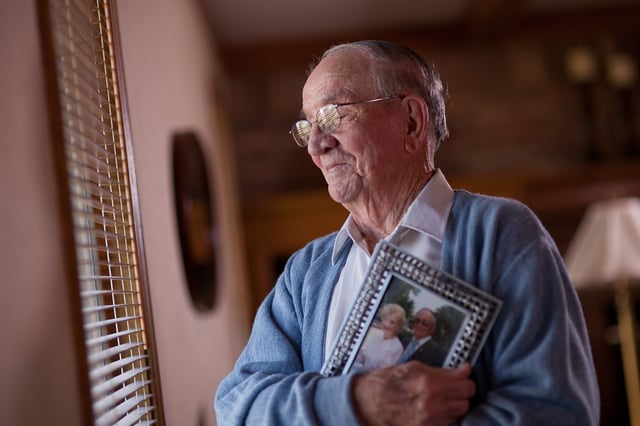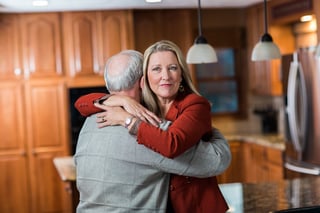Home Care Expert Insider Blog
- Home
- Home Care Expert Insider Blog
Hurricane Prepping While Caring for a Loved One with Alzheimer's
- Home
- Home Care Expert Insider Blog
- Hurricane Prepping While Caring for a Loved One with Alzheimer's
August 15, 2017

Providing Home Care and Home Prep at the Same Time
In and of themselves, hurricanes are scary. You're monitoring the pending storm, readying your home, deciding to evacuate, living in a hotel, and returning to a home that may be damaged or, heaven forbid, destroyed. Just the uncertainty surrounding the situation can make anyone feel some anxiety. Now imagine going through that situation with a cognitive impairment such as Alzheimer's/dementia. As a primary caregiver to a loved one with dementia, here are some things to think about while keeping seniors safe during a hurricane.
Some quick facts about Alzheimer's. According to the Alzheimer's Association, 5 million Americans currently live with Alzheimer's disease. And the disease is only progressing, by 2050 that number could reach 16 million. There are currently 15 MILLION PEOPLE PROVIDING UNPAID CARE for people with Alzheimer's or other dementias.
So how DO you provide care for someone with Alzheimer's while preparing for a hurricane?
We know the cognitive symptoms associated with Alzheimer's/ dementia are:
- Memory loss that disrupts daily life
- Challenges in planning
- Confusion with time or place
- Misplacing things
- Trouble understanding visual image and spatial relationships
...with the behavioral symptoms being:
- Nighttime wakefulness and other sleep problems
- Rummaging around or hiding things
- Wandering
With that in consideration, here are 4 things to keep in mind when helping a senior loved one through a stressful time.
1. Take the Team approach.
As a primary caregiver for someone who has cognitive impairments, it's hard not to feel like everything falls on you. It's sometimes difficult to continue the same level of care and attention when you are trying to prepare for something stressful like a hurricane. Having a partner, friend or an in-home caregiver come and spend time with your loved one can help free you up to complete any necessary preparations without passing on undue worry.
2. Remain Calm
A senior with Alzheimer's/dementia can sense when those around them are anxious, especially their primary caregiver. Working hard to keep yourself calm in stressful situations is not only a benefit for your personal health, but also keeps your loved one from shouldering unnecessary emotional stress that they simply don't have the capacity to bear.
3. Stay with your loved one
Change of place or perceived stress may trigger behavioral symptoms that have never surfaced before, such as wandering. When in an unknown place, stay with your loved one. Should you need to leave, make sure you have someone that can keep an eye on him/her in your absence, even if it's just for a short bit. Registering with MedicAlert®+ Alzheimer's Association Safe Return® can also be a precautionary step. This service is monitored 24/7 should an emergency arise.
4. Use these Alzheimer's behavioral symptom management strategies
- Redirect. The first time a question or concern comes up, take a few moments to answer the question fully and provide reassurance that all is well. If that doesn’t work, try to engage the senior in a related topic. For example: “Tell me about your favorite season.’’ “What was your favorite memory about that season?” “What kid of fun things did you do in the fall?” Sometimes discussing the topic (in this case seasons) a bit more will lead her away from the repetitive behavior and calm her anxiety.
- Utilize the person’s life story for ideas. The Alzheimer's/dementia CARE training program encourages caregivers to know seniors well, which is easy for family. For instance, when a caregiver knows that the person loves country western music or enjoyed quilting, they can ask that individual about this new and favored topic to “change the subject,” but in a meaningful and respectful way.
- Physically move the items or senior from the environment. If the menu, in this case, or an object, in general, continues to agitate or irritate, remove the senior or the object from that situation.
- Offer simple choices. Persons with dementia still want to feel in control of their lives. The CARE program teaches that one way to break a repetitive question cycle is to offer a simple choice, “Speaking of rain, Mom, what color umbrella should we pick up today, red or black?”
- Apologize and take the blame. Apologize and take the blame. Apologizing or taking the blame in a situation (even when it’s not your fault) diffuses many situations. In this case, the family member can apologize for not understanding her concern or question and then try to move Mom away from her anxiety about hurricane planning.
 Approaching stressful situations with love, care and respect is always a win. Keep in mind that no matter how frustrating the moment, take a breath and think about how your loved one would have reacted before Alzheimer's. This helps remind you that behavior symptoms are just that, symptoms, not the person. When in doubt, just hug them tight and remind them how much you love them.
Approaching stressful situations with love, care and respect is always a win. Keep in mind that no matter how frustrating the moment, take a breath and think about how your loved one would have reacted before Alzheimer's. This helps remind you that behavior symptoms are just that, symptoms, not the person. When in doubt, just hug them tight and remind them how much you love them.
Need an hurricane supply checklist? Check out part 1 of this blog series, Hurricane planning for seniors.
Need help caring for a loved one with Alzheimer's/Dementia? Get a FREE dementia home care consultation to see how home care may be the right move for you.

